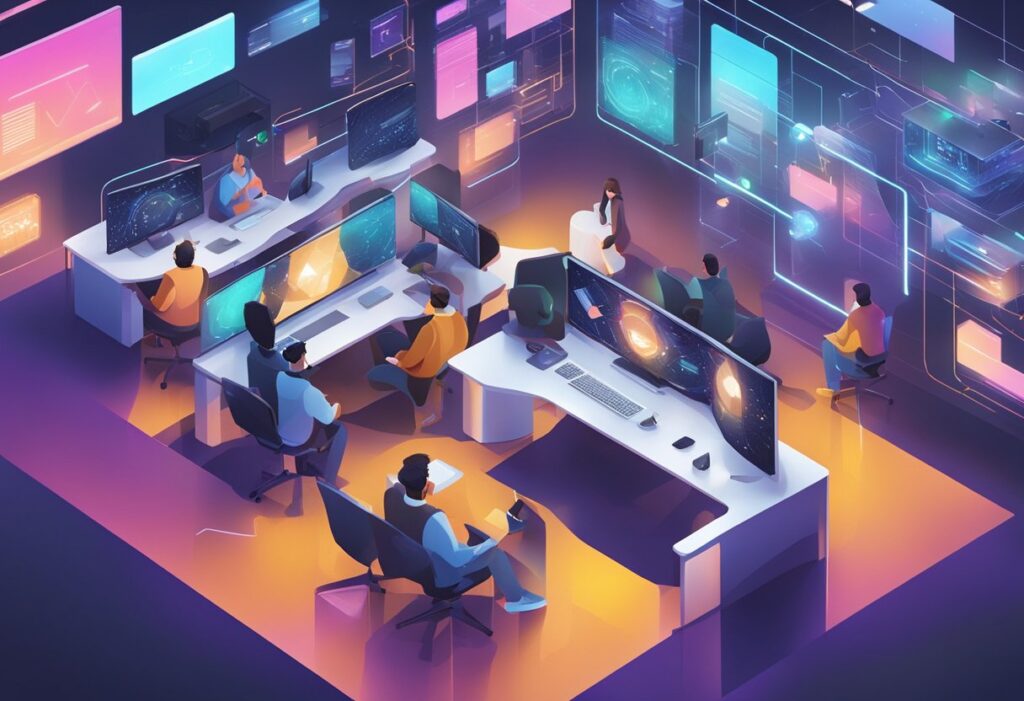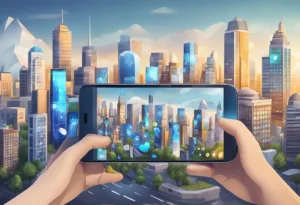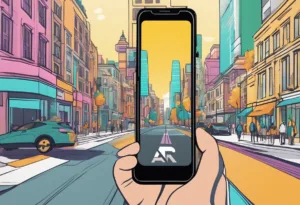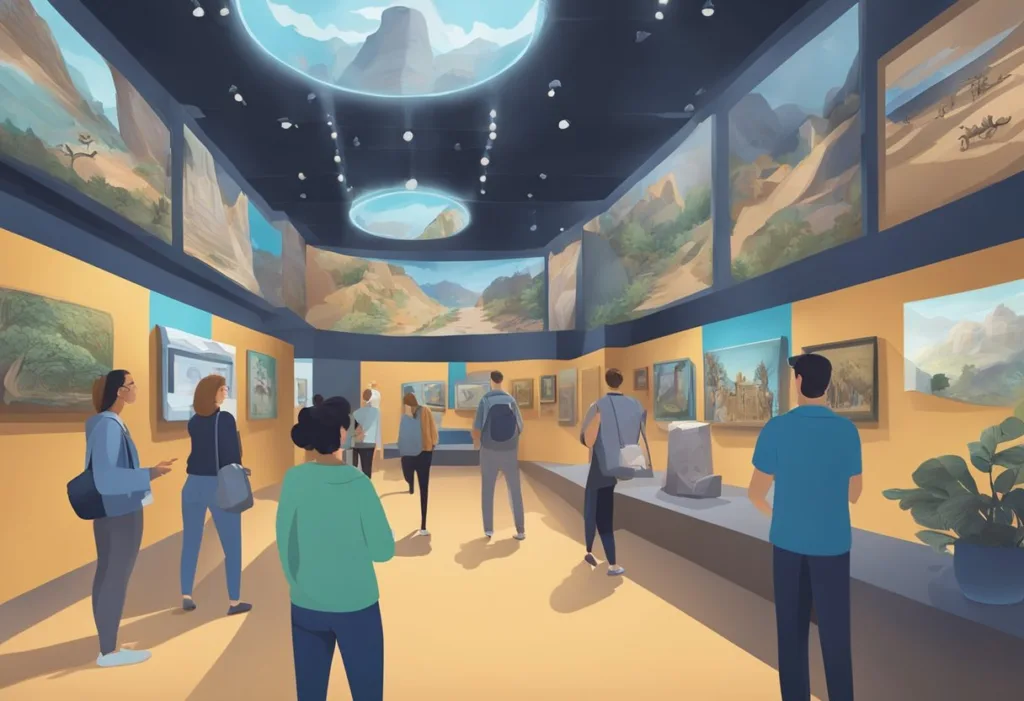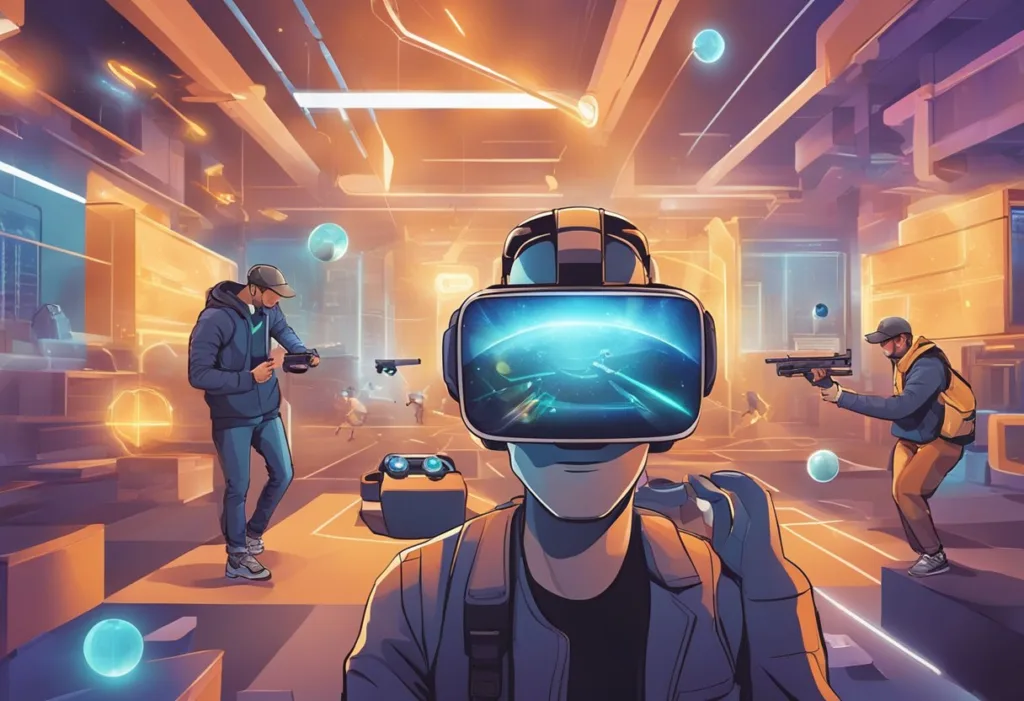Metaverse developers are the individuals who create and design the virtual world of the metaverse. The metaverse is a term that describes a shared virtual space that is created by the convergence of the physical and digital worlds. It is a fully immersive environment that is accessed through virtual reality (VR) technology.
In order to become a metaverse developer, one must have a strong background in computer science and programming. They must also be familiar with the latest VR technology and have experience in creating 3D environments. Metaverse developers must be able to work collaboratively with other developers and designers to create a cohesive and fully immersive virtual world.
The demand for metaverse developers is on the rise as more companies and individuals are looking to create their own virtual worlds within the metaverse. This presents a unique opportunity for individuals with a passion for VR technology and a strong background in computer science to enter a rapidly growing field. The following sections will explore the scope, skills, and salary of metaverse developers in more detail.
Understanding the Metaverse
The metaverse is an immersive world created by the convergence of various technologies such as augmented reality, virtual reality, and mixed reality. It is a virtual space where users can interact with each other in real-time and experience immersive experiences.
To understand the metaverse, it is essential to understand the key technologies and platforms, virtual, augmented, and mixed realities, and the role of AI and machine learning.
Key Technologies and Platforms
The metaverse is built on a combination of technologies such as blockchain, NFTs, and extended reality. Blockchain is used to ensure security, transparency, and decentralization, while NFTs are used to create unique digital assets that can be traded and owned by users.
Extended reality (XR) is used to create immersive experiences that blur the lines between the real world and the virtual world.
Virtual, Augmented, and Mixed Realities
Virtual reality (VR) is a technology that immerses users in a completely digital environment. Augmented reality (AR) overlays digital objects onto the real world, while mixed reality (MR) combines the two to create a seamless experience. These technologies are used to create immersive experiences in the metaverse.
The Role of AI and Machine Learning
AI and machine learning play a crucial role in the metaverse by enabling intelligent interactions and personalization. AI is used to create intelligent avatars that can interact with users, while machine learning is used to personalize the user experience based on their preferences and behavior.
The metaverse is an immersive world created by the convergence of various technologies. It is built on a combination of technologies such as blockchain, NFTs, and extended reality, and uses virtual, augmented, and mixed realities to create immersive experiences. AI and machine learning play a crucial role in enabling intelligent interactions and personalization in the metaverse.
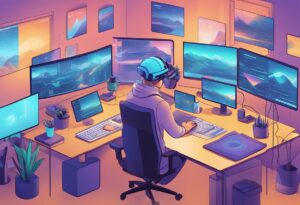
Metaverse Development Essentials
Developing for the Metaverse requires a unique set of skills and tools. This section covers the essential aspects of Metaverse development, including programming languages and frameworks, 3D modeling and animation, and Metaverse infrastructure.
Programming Languages and Frameworks
Metaverse developers need to be proficient in programming languages such as Python, Java, and Swift. These languages are widely used in software development and web development and are essential for developing Metaverse applications.
Developers also need to be familiar with popular game engines such as Unreal Engine and Unity. These engines provide developer tools and SDKs that make it easier to create immersive experiences in the Metaverse.
3D Modeling and Animation
Developers must have experience in 3D modeling and animation to create 3D spaces and objects in the Metaverse. Blender is a popular open-source software used for 3D modeling and animation. Developers must be proficient in using Blender to create 3D models and animations and integrate them into Metaverse applications.
Metaverse Infrastructure
Metaverse infrastructure is a critical aspect of Metaverse development. Developers must be familiar with the infrastructure required to create and deploy Metaverse applications.
This includes knowledge of XR SDKs, which provide the necessary tools and APIs to create immersive experiences for VR and AR devices. Developers must also be familiar with cloud-based infrastructure services such as AWS and Google Cloud, which provide the necessary resources to deploy Metaverse applications.
Metaverse development requires a unique set of skills and tools. Developers must be proficient in programming languages and frameworks, 3D modeling and animation, and Metaverse infrastructure. By mastering these essential elements, developers can create immersive experiences in the Metaverse that are engaging and interactive.
Top 7 Metaverse Development Companies
The Metaverse is a rapidly growing industry, and there are numerous companies working to harness its full potential. Here are the top 7 Metaverse development companies, based on their experience, expertise, and reputation in the field:
- SoluLab
- Nextech AR Solutions
- Unity Technologies
- Epic Games
- Roblox Corporation
- Decentraland
- The Sandbox
Unity Technologies
Unity Technologies is a leading Metaverse development company that provides a wide range of services, including Metaverse application development, Metaverse NFT marketplace development, 3D spaces development, decentralized platform development, Metaverse integration services, Metaverse game development, Metaverse real estate development, and more. Unity Technologies is known for its high-quality work and innovative solutions.
Epic Games
Epic Games is a well-established Metaverse development company that provides a variety of services, including Metaverse game development, Metaverse real estate development, and more. Epic Games is known for its Unreal Engine, which is widely used in the Metaverse industry.
Roblox Corporation
Roblox Corporation is a popular Metaverse development company that provides a platform for users to create and share their own Metaverse experiences. Roblox Corporation is known for its user-friendly platform and its large community of creators and users.
Decentraland
Decentraland is a Metaverse development company that provides a decentralized platform for users to create and share their own Metaverse experiences. Decentraland is known for its innovative solutions and its commitment to decentralization.
The Sandbox
The Sandbox is a Metaverse development company that provides a platform for users to create and share their own Metaverse experiences. The Sandbox is known for its user-friendly platform and its large community of creators and users.
SoluLab
SoluLab is a Metaverse development company that provides a wide range of services, including Metaverse application development, Metaverse NFT marketplace development, 3D spaces development, decentralized platform development, Metaverse integration services, Metaverse game development, Metaverse real estate development, and more. SoluLab is known for its high-quality work and its innovative solutions.
Nextech AR Solutions
Nextech AR Solutions is a Metaverse development company that provides a variety of services, including Metaverse game development, Metaverse real estate development, and more. Nextech AR Solutions is known for its innovative solutions and its commitment to quality.
These Metaverse development companies are at the forefront of the industry, and they are leading the way in creating innovative and immersive Metaverse experiences. With their expertise and experience, they are well-positioned to help shape the future of the Metaverse.
The Metaverse Ecosystem
Major Companies and Platforms
The metaverse ecosystem is rapidly evolving, with major companies and platforms like Meta, Roblox, Microsoft, Facebook, Amazon, Apple, and Google vying for dominance. These companies are investing heavily in metaverse development, creating products, and services that enable users to access virtual worlds, gaming, content creation, and distribution, avatars, media, entertainment, social media, networking, and shopping.
Meta, formerly known as Facebook, is one of the leading players in the metaverse ecosystem. The company has invested $10 billion in metaverse development and is working on a 10-15 year timeline. Meta’s current portfolio includes the Meta Quest 2 VR headset, the Horizon Worlds social VR platform, and the Spark AR Studio.
Roblox is another major player in the metaverse ecosystem, with over 200 million monthly active users. The platform allows users to create and play games, socialize, and participate in virtual events. Roblox is also investing in metaverse development, with plans to expand its offerings to include virtual concerts, shopping experiences, and more.
Content Creation and Distribution
Content creation and distribution are critical components of the metaverse ecosystem. Users need access to high-quality content that is engaging and immersive. Companies like Meta, Roblox, and Microsoft are investing in tools and services that enable users to create and distribute their own content.
Meta’s Spark AR Studio allows users to create augmented reality experiences that can be shared on social media. Roblox’s Studio enables users to create games, virtual worlds, and experiences. Microsoft’s Metaverse Stack provides a set of tools and services that enable developers to create metaverse experiences.
User Interaction and Community Building
User interaction and community building are essential components of the metaverse ecosystem. Companies like Meta, Roblox, and Microsoft are investing in social features that enable users to connect and interact with each other.
Meta’s Horizon Worlds platform allows users to socialize, play games, and participate in virtual events. Roblox’s social features enable users to connect with friends, join groups, and participate in virtual events. Microsoft’s Metaverse Stack includes social features like chat, voice, and video capabilities.
The metaverse ecosystem is rapidly evolving, with major companies and platforms investing heavily in metaverse development. Content creation and distribution, user interaction, and community building are critical components of the metaverse ecosystem.
Companies like Meta, Roblox, and Microsoft are leading the way in metaverse development, creating products and services that enable users to access virtual worlds, gaming, content creation, and distribution, avatars, media, entertainment, social media, networking, and shopping.
Professional Development in Metaverse
Skills and Expertise for Metaverse Developers
Metaverse developers need to have a combination of technical and soft skills to succeed in their careers. They should be proficient in programming languages such as C++, Python, and Java, as well as have experience with 3D modeling and design tools.
In addition, they should have a strong understanding of blockchain technology and decentralized applications. Soft skills such as communication, teamwork, and problem-solving are also essential for metaverse developers to effectively collaborate with other engineers and designers.
Career Opportunities and Market Demand
The demand for metaverse developers is growing due to the increasing popularity of virtual worlds and decentralized applications. According to recent technology news, the global metaverse market is expected to reach $1.3 trillion by 2030, with a registered CAGR of 44.5% from 2022 to 2030.
This growth is creating new job opportunities for skilled metaverse developers. The job description for metaverse developers includes designing and developing immersive virtual environments, creating decentralized applications, and integrating 3D models and designs to enhance user experience.
Salaries for metaverse developers vary based on experience and location. According to recent data, some companies offer annual salaries of around $97,000 for metaverse developers. Metaverse developers can expect to attend meetings and collaborate with other developers and designers to create engaging and immersive virtual worlds.
Metaverse developers require a combination of technical and soft skills to succeed in their careers. The demand for metaverse developers is growing, and the job opportunities and salaries are expected to increase as the metaverse market expands.
Emerging Trends and Future Outlook
Next-Generation Technology Advancements
As the metaverse continues to evolve, developers are constantly exploring new technologies to enhance the user experience. Advancements in 5G, IoT, machine learning, and data privacy are expected to play a crucial role in shaping the future of the metaverse.
The Universal Scene Description (USD) format is also gaining popularity, allowing developers to create and share 3D scenes across different software platforms. NVIDIA’s RTX technology is another key advancement that enables real-time ray tracing and immersive experiences.
Impact on Society and Industry
The metaverse has the potential to revolutionize the way people interact with each other and with technology. It could transform industries such as gaming, entertainment, education, and healthcare.
The concept of digital twins, where virtual replicas of physical objects or systems are created, could have far-reaching implications for urban planning and infrastructure management. Blockchain technology is also being explored as a means to enable secure transactions within the metaverse, with projects like Decentraland and Ethereum paving the way.
The future of the metaverse is exciting and full of possibilities. Developers are constantly pushing the boundaries of what is possible, and new technologies are emerging all the time. As the metaverse becomes more mainstream, it will undoubtedly have a significant impact on society and industry.
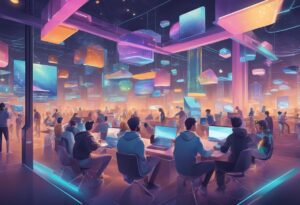
Frequently Asked Questions
What are the essential skills required for a Metaverse developer?
Metaverse developers require a strong foundation in computer science, programming, and software development. They should be proficient in languages such as C++, Java, and Python, as well as have experience with 3D modeling and game engines. They should have a good understanding of blockchain technology, cryptography, and distributed systems.
Which development tools are predominantly used in Metaverse projects?
Metaverse developers predominantly use game engines such as Unity and Unreal Engine for creating virtual worlds and environments. They also use blockchain development tools such as Solidity and Web3.js for building decentralized applications on the blockchain. They use 3D modeling software such as Blender and Maya for designing and creating 3D assets.
What is the typical cost associated with developing a Metaverse application?
The cost of developing a Metaverse application can vary widely depending on the complexity of the project. Small-scale projects can cost as little as a few thousand dollars, while larger projects can cost several million dollars. Factors that affect the cost include the number of developers, the complexity of the application, the technology used, and the time required to complete the project.
How does one start a career as a Metaverse developer and what does the roadmap look like?
To start a career as a Metaverse developer, an individual should have a strong foundation in computer science and programming. They can gain experience by working on small-scale Metaverse projects or contributing to open-source Metaverse projects. They can attend conferences and workshops to learn more about Metaverse development. The roadmap to becoming a Metaverse developer involves gaining experience in programming, 3D modeling, and blockchain development.
What are the top companies or projects leading the way in Metaverse development as of 2023?
As of 2023, some of the top companies and projects leading the way in Metaverse development include Decentraland, Somnium Space, The Sandbox, and CryptoVoxels. These companies are creating decentralized virtual worlds and marketplaces where users can buy, sell, and trade virtual assets using cryptocurrencies.
What is the average salary range for a Metaverse developer in the United States?
The average salary range for a Metaverse developer in the United States is between $80,000 and $150,000 per year, depending on the level of experience and expertise. The salary can vary depending on the location, company, and specific role within the Metaverse development team.

